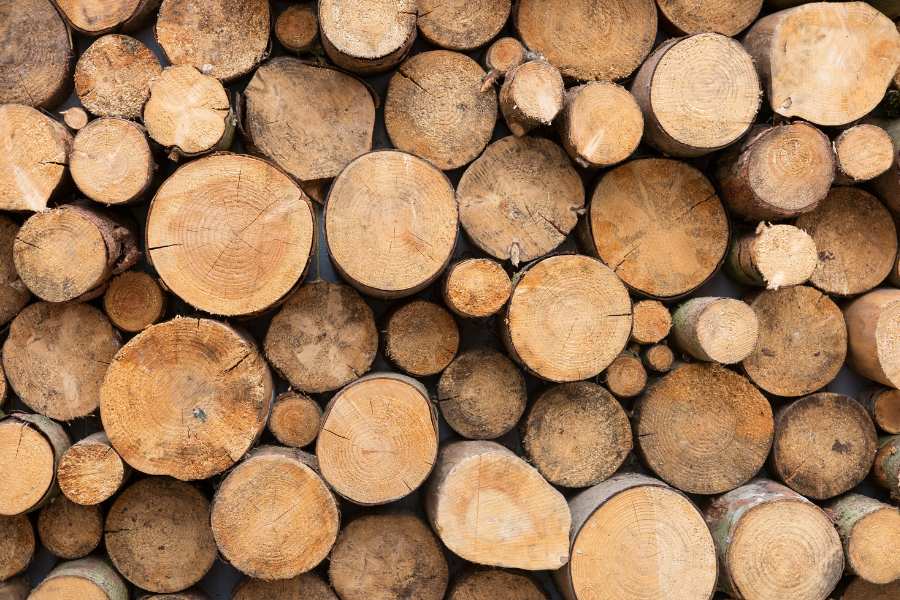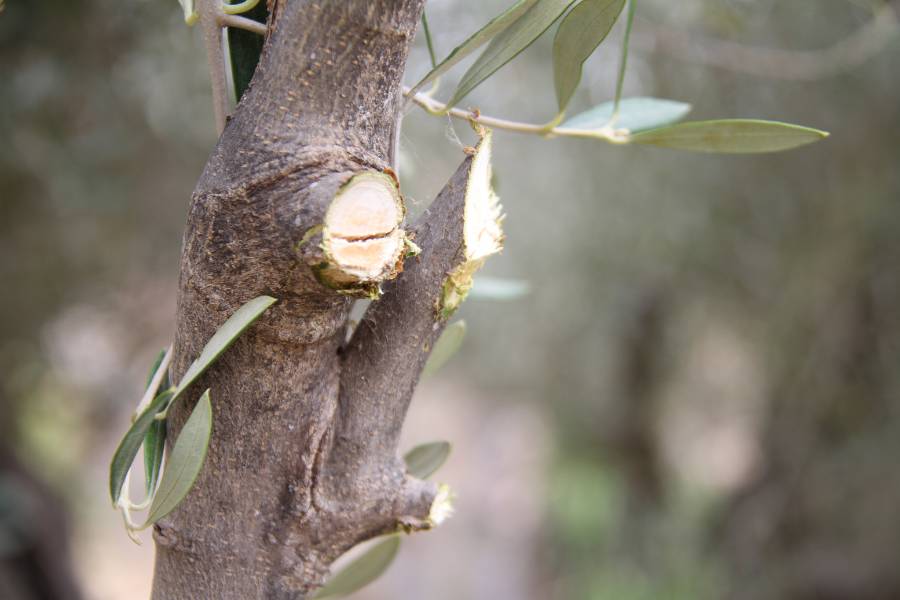
What are olive logs? Why should I be using olive logs?
Olive wood logs come from pruned branches or felled olive trees (usually older and non-productive ones). Olive logs are highly sought after for firewood due to its unique properties. There are many advantages to using olive logs as firewood, such as:
- High heat output: Burns hot and long, making it efficient for heating
- Slow burning: Dense hardwood that burns slowly, which is ideal for longer fires
- Pleasant aroma: Releases a subtle, sweet, and slightly fruity scent — great for indoor fireplaces or wood ovens
- Low smoke: Burns clean with minimal smoke if properly seasoned / kiln dried
- Good for cooking: Popular in wood-fired ovens and grills, especially for baking pizza or smoking meat
In this article, we will discuss what exactly are olive logs and why they should be considered as a viable source of fuel.
What are olive logs? How are olive logs produced?

Olive logs are mainly produced in countries where olive farming is widespread, especially those in the Mediterranean region, which is the native habitat of the olive tree (Olea europaea). These include Spain, Italy, Greece, Turkey and Egypt.
Producing olive logs for firewood involves a natural, low-tech process rooted in traditional olive farming practices. Here’s a step-by-step overview of how olive wood logs are produced, from field to firewood:
1. Sourcing olive wood:
Pruning: Olive trees are pruned annually or biannually to increase fruit yield. The thicker branches from this process can be used for firewood. Tree Removal: Old, diseased, or unproductive olive trees are occasionally uprooted or cut down and replaced. These full trees provide high-quality hardwood logs.
2. Cutting and harvesting
Chainsaws or handsaws are used to cut down trees or thick branches. The wood is then trimmed into manageable sections, often ranging from 30 to 50 cm (12–20 inches) for firewood. Smaller twigs and leaves are usually discarded, composted, or burned.
3. Kiln drying of olive logs
Kiln drying is a controlled process that rapidly reduces the moisture content of firewood, including olive logs, by circulating heated air (usually 50–90°C) in an enclosed chamber. This method typically dries wood in 4–7 days—far faster than air drying—and ensures consistent, clean-burning logs with less smoke and creosote buildup. Kiln drying also kills insects and fungi, making the wood safer and more efficient for heating or cooking. While it involves higher energy costs, it produces superior firewood with reliable performance and lower moisture levels less than 20%.
4. Ready for sale and use
Once the logs are fully kiln dried, they are shipped to us to be sold as bulk firewood. Boyle’s Solid Fuels sell kiln dried olive logs in 25 or 50 bags. Olive logs are among the best types of firewood if you’re looking for:
- High efficiency
- Clean burning
- Aromatic cooking
- Sustainable sourcing
Reasons why you should use olive logs

If you’re still not convinced about using olive logs as a fuel source, here are some compelling reasons to consider:
1. High heat output (high calorific value)
Olive wood is a very dense hardwood, meaning it contains more energy per log compared to many other types of firewood. It produces a long-lasting, steady heat, making it excellent for heating homes and cooking. Energy content: ~7.4–8.5 kWh/kg — similar to or higher than oak and beech.
2. Slow, clean burn
Burns slowly and evenly thanks to its density. Produces minimal smoke when properly seasoned, which is ideal for:
- Indoor fireplaces
- Wood burning stoves
- Wood-fired ovens
3. Pleasant aroma
Emits a mild, sweet, slightly fruity smell while burning — not overpowering. This makes it a popular choice for wood-fired cooking, especially in:
- Pizza ovens
- BBQ smokers
- Grills
4. Low spark and residue
Produces few sparks and minimal ash, making it safer for open fireplaces and cleaner to manage. Less creosote buildup in chimneys if properly dried.
5. Sustainably sourced
Olive wood is a byproduct of olive farming (from pruning and tree replacement). Using it as firewood:
- Reduces agricultural waste
- Supports renewable energy practices
- Lowers pressure on forests compared to cutting trees solely for firewood
6. Durability for storage
Once seasoned, olive logs store well with low risk of insect infestation or decay due to their density and oil content. Less likely to rot than softer woods if stored correctly.
7. Versatile use
Last but not least, kiln dried olive logs are ideal for:
- Home heating
- Wood-burning stoves
- Traditional cooking
- Outdoor fire pits
- Often used in high-end restaurants for wood-fired ovens or grilling.
Choose Boyle’s Solid Fuels for all your home heating needs
At Boyle’s Solid Fuels, we are dedicated to providing high quality coal, solid fuels and kiln dried logs for all your home and business heating needs. We understand the importance of having a reliable and cost-effective heating source all year round, which is why we offer a wide range of products that are suitable for every season.
During the colder months, our kiln dried olive, ash, oak and birch logs provide efficient heat with low moisture content, making them perfect for open fires, stoves, cooking and even outdoor fire pits. Our specially sourced birch kindling is also essential for starting any fire easily and quickly.
At Boyle’s Solid Fuels, we pride ourselves on our excellent customer service and strive to meet the needs of all our customers. We offer special collection offers, delivery deals and individual prices that are as low as they can go. Free Dublin Delivery is available on all orders and Free Nationwide Delivery is available on all orders over €199. Getting your home heating fuel has never been easier.
Choose Boyle’s Solid Fuels for all your home heating needs and let our family help yours stay warm and comfortable throughout the year. Contact us now at 0851047554 or visit our online shop to view our products and special offers.
FAQs

What are olive logs, and how are they different from other woods?
Olive logs are pieces of wood harvested from olive trees. Unlike other woods, olive wood is a dense and hard wood that burns longer and hotter, making it ideal for wood burners and stoves. The unique properties of olive wood, including its thin layer of bark, make it a popular choice for high-efficiency heating.
Why should I use olive logs in my wood burner?
Olive logs are an excellent choice for wood burners and stoves because olive wood is a hard wood that produces a long-lasting, intense heat. Additionally, using olive firewood supports sustainable practices as it often comes from cut timber resulting from pruning or replanting processes of olive trees.
How does olive wood compare to green wood for burning?
Olive wood is preferable to green wood for burning because it is a hard wood that has been properly kiln dried, allowing it to burn more efficiently. Green wood, on the other hand, contains higher moisture levels, which can result in less heat and more smoke. Kiln dried olive logs provide a cleaner, hotter burn.
Are olive logs environmentally friendly?
Yes, olive logs can be considered environmentally friendly. They are often sourced from olive trees through sustainable replanting processes. Using olive wood helps to support these practices and ensures that the wood is harvested responsibly, making it a more eco-conscious choice compared to other woods.
Conclusion
In conclusion, olive logs are a versatile and sustainable source of energy that offers many benefits. Choosing to use kiln dried olive logs as a fuel source is a practical and efficient option for all your home heating needs. At Boyle’s Solid Fuels, we offer the highest-quality kiln dried olive logs and solid fuels at competitive prices to meet all your heating needs.
